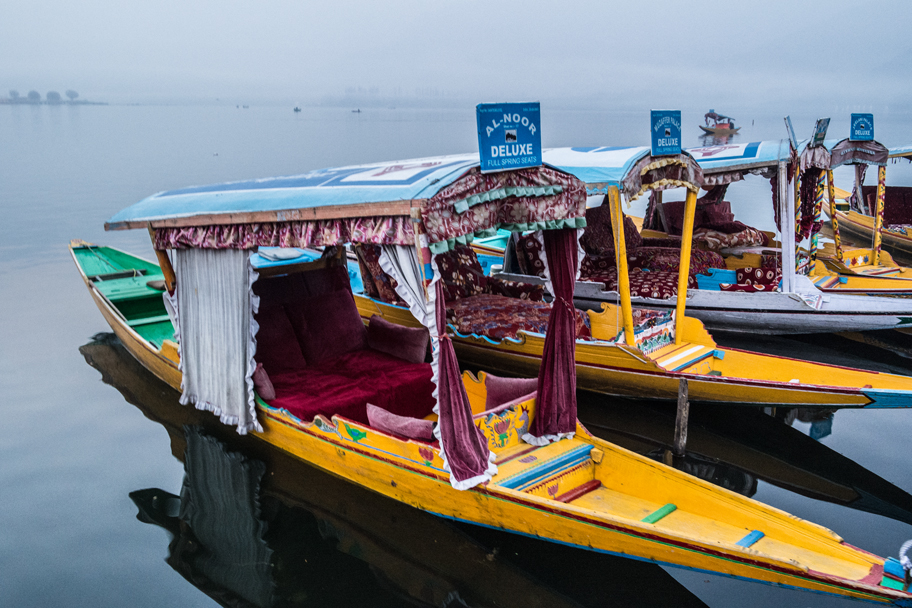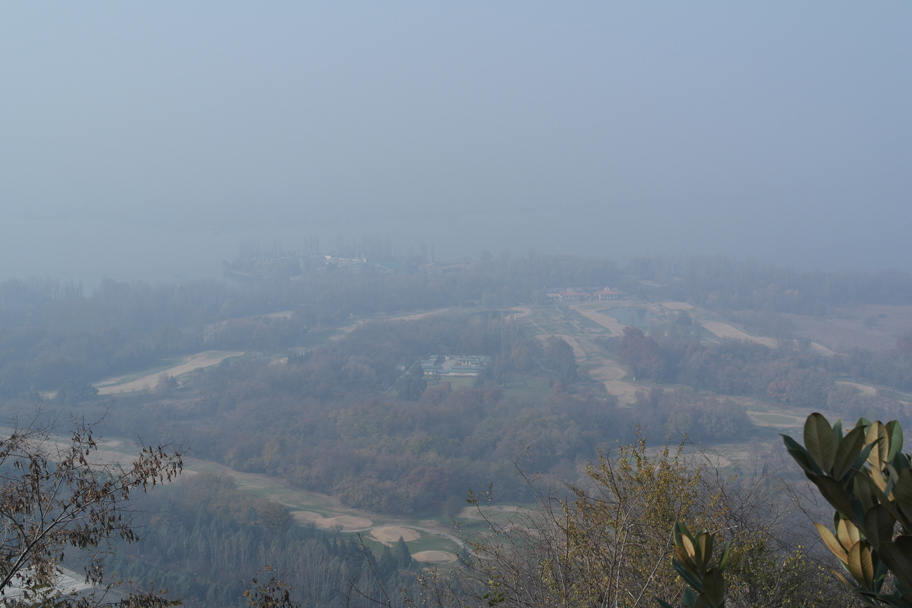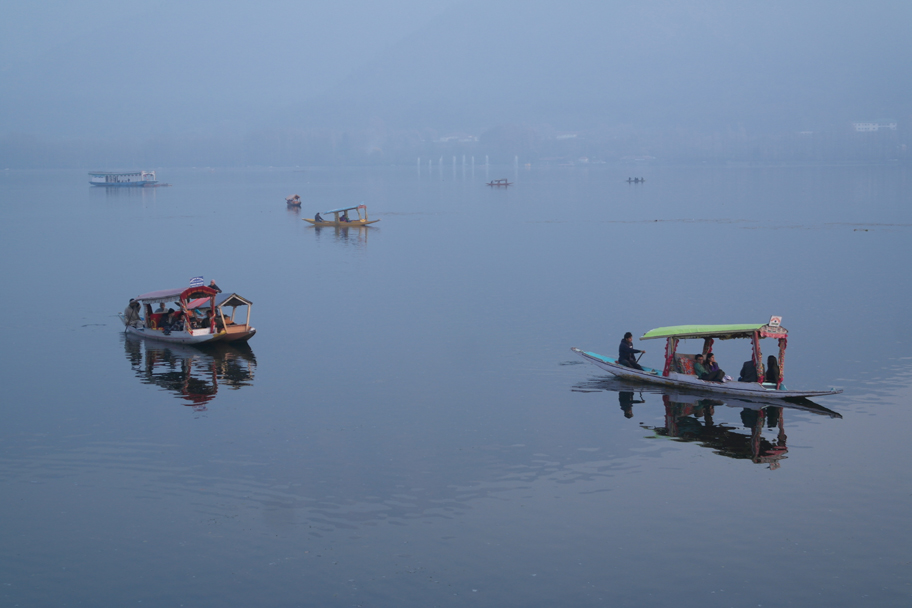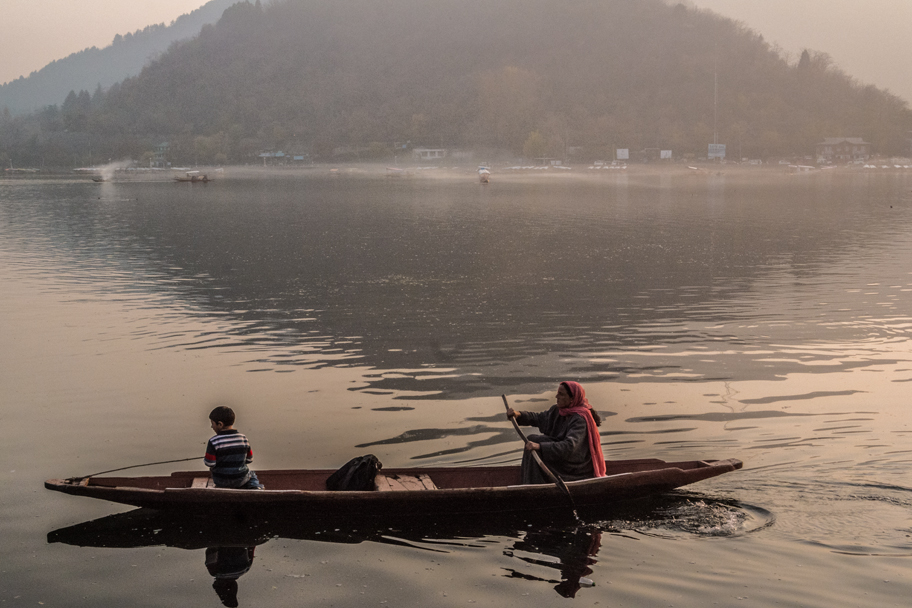My decision to go to Kashmir was a conflicted one, to say the least. Every other Indian I met either urged me to go on account of the natural beauty, or warned me against the bitter cold. Meanwhile, the US State Department cautioned against “all but essential” travel to the area due to the civil unrest that has plagued the state for over fifteen years. But in my experience, if an American gets his wallet stolen from a train station in the middle of the night, it is declared a possible terrorist threat and all tourists are expected to flee the country as soon as possible. In the end, the prospect of staying on a houseboat in the middle of a lake was too good to pass up.
As we flew over the Himalayas, I snapped pictures of every peak that seemed to rise above the others. There’s Everest! I thought. Or is it that one? After a while, I figured nobody would know the difference anyway, and began daydreaming about what it would be like to make the treacherous climb. It really didn’t seem that difficult, until the clouds parted and I remembered that I was in a plane. Then all I could think about was why anyone would climb when it seemed a whole lot easier to fly.
When we landed, I was a little disappointed to find that Srinagar, the (summer) capital of Kashmir, was not really in the mountains at all, but settled in a valley, from which the snow-capped peaks were not visible. It was also difficult not to notice the dozens of military officers sporting assault rifles. Nonetheless, it was easy to find a taxi and off we went.
We reached Dal Lake around 4:30pm. The gigantic and oddly-shaped body of water is barely disturbed by the hundreds of boats that skate across its surface, giving them the appearance of floating in mid-air. As beautiful as that may be, the frigid temperatures, which drop well below freezing in the evening hours, make whatever pleasure that might be had from looking at the lake short-lived. Locals constantly praise the beauty of the surrounding mountains, but it became increasingly apparent that this was not the time of year to capture it. The low-hanging fog that never seemed to lift obscured anything further than about thirty yards, and the trees had all lost their autumn colors in the wake of winter’s approach. Fortunately, there was enough trash strewn about to brighten the place up a bit. As I took in my new environment, I couldn’t help but think it looked a lot like my hometown in Oregon…shorty after the apocalypse.
“Which hotel?” the driver asked. “Royal Dandoo Palace of Houseboat,” I replied. The only thing more embarrassing than having to say that name over and over during the course of my two days in Srinagar, was having to explain why I was only staying for two days. Truly, it was the cold. And it wasn’t so much the temperature itself, as it was the local custom that heat was unnecessary. Despite being a state that gets so cold they have to move the capital south for winter, it can be extremely difficult to find hot water or even an electric furnace. You pay extra for every second you wish to feel mildly comfortable, and even those opportunities are few and far between. I climbed into a Shikara, the Kashmiri word for over-priced water taxi, and we took off toward my hotel on the other side of the lake.
As we approached, I was greeted by a man named Bashir. He took me to my room, which looked like nothing had been touched since it was decorated by Madame Tussaud sometime in the 1800s. An English couple, who was also staying on the boat, mentioned that one of the ornate lamps that graced their bedside table did not even have a cord attached to it. “But is it art?” I asked. Bashir brought me some tea as I unpacked my things and began planning my upcoming itinerary.
My main reason for going to Srinagar was Rozabal, a mosque, which is said to house the true remains of Jesus. According to many Arabic and Sanskrit documents unearthed over the last few centuries, Jesus traveled to India during his early years, and after surviving the crucifixion, spent the rest of his life teaching in Kashmir, where he eventually died of natural causes. Being inclined toward all things spiritual but more or less a realist at heart, I have been fascinated with this story and couldn’t pass up the opportunity to see it for myself.
After chatting with Bashir for a while, a man arrived and introduced himself as Ali, part of the family that owned the houseboat. Appearing as though he may have taken a wrong turn off Fifth Avenue, he was as well-dressed as he was attractive, and possessed the kind of charm that would make a eunuch swoon. He asked me if I would like to have dinner with him and his family, and without considering the fact that I had already eaten, I said, “Sure! I’m starving!” Fortunately for me, they were having lamb, and despite the fact that Kashmir is the Texas of India as far as meat is concerned, nowhere is vegetarianism met with anything but respect. Instead, I had tea and sat in the corner, observing a real-life Indian family in action.
The entire home seemed to consist of a kitchen, a bathroom, and a living room, where we were all gathered. I later learned that they own several guesthouses in the area and slept in whichever ones happened to be vacant. There was Ali, his brother Nashid, his father, grandmother, and sister, as well as her two boys—one about five years old, and the other barely able to walk on his own. The younger of the two was clearly the favorite, as they spent the majority of the dinner screaming at the older one to get away from the TV. “I love him but I don’t like him,” the grandfather remarked.
The walls were mint green with orange trim, and there was no furniture—just a bunch of pillows and blankets cluttering the Persian carpets that covered the wooden floor. And, according to Kashmiri custom, no heat. I could see my breath as I made small talk with the three men, who seemed to be the only English speakers in the room. This is when I was introduced to the Kangri, a small basket holding a clay pot filled with hot coals. You put the basket beneath your blanket and in minutes, it’s as if the cold becomes a distant memory. Referred to as a “winter wife,” the brother added that “a regular wife only works 8-10 hours a day, while a winter wife works all 24.”
I knew that Indians ate with their hands but in my experience, that was only when bread was available to sop up whatever liquid happened to be part of the meal. In this case, each person was given a bowl of rice, to which lamb and sauce was added. They then proceeded to scoop it out, one fistful at a time, with total disregard for the mess being made. A communal bowl of water sat in the middle of the floor, and was used to rinse their hands between bites. Since water is the greatest threat to all foreigners traveling in India, I was happy to have avoided this particular cultural experience. They finished quickly and soon it was time to say goodnight. Ali, on the other hand, wanted to hang out a little longer and we both headed back to the houseboat.
It may seem very normal to be a wealthy bachelor in your thirties in America, but in India, it most definitely is not. To be over twenty-five and “unmarried,” as they call it, means there is something fundamentally wrong with you. And considering his Bollywood looks and considerable financial success, it was clear that this was a lifestyle he had chosen for himself, and something is family was willing to overlook. We discussed housing prices and economic growth, until the true purpose of our late-night tryst became clear.
After mentioning the vast empire that is his family’s tourism company—spanning several states and dozens of cities—he asked if I might be interested in joining a few other westerners on a shared itinerary through Rajasthan. Every excuse I could come up with was met with a convenient solution, and like every pitch you receive in India, there is a very specific way of tip-toeing around the issue of cost that makes you feel like a cheapskate for being the first one to mention it. To be honest, the details of the proposition were attractive. Or at least I think they were. At one point I stopped paying attention and started wondering how he managed to have such perfect teeth in a country that puts about as much emphasis on dental care as it does on sanitation and public safety. I told him I would think about it.
We had made plans to have breakfast the following morning, and after sitting in the dining room for a little over an hour, I started to wonder if I’d been stood up. Wandering aimlessly around the dock, I ran into Nashid and asked if he had heard from Ali. He enthusiastically told me that he was on his way. “Twenty minutes,” he said, along with the popular phrase given to any foreigner who seems unsettled, “no problem, brother.”
After another hour, I started to get irritated. I pride myself on having super human patience—a necessary trait to enjoy any time spent in India—but I didn’t have a lot of time to see the few things that were on my to-do list. Finally, Bashir said he would call. He handed me the phone and on the other end was Ali, who had clearly not left his house. “What do you think about Rajasthan?” he asked immediately. I awkwardly explained that I didn’t know exactly what my plans were…plus, I didn’t really have the money, so it was probably best if I passed. His voice changed instantly. “No problem, brother,” he said, “I’ll be there in twenty minutes.”
Fearing that my bromance had come to an end, and realizing that “twenty minutes” meant “probably never,” I told Bashir that I didn’t want to wait any longer and he called me a Shikara to take me to the city. At this point, Nashid offered to arrange a taxi to take me on a tour. “Only 1,200 rupees,” he said, adding “It would be at least 2,000 in town.” It was only 500 rupees to get all the way from the airport to the houseboat. For 2,000 I should be carried by a dozen men and fed grapes along the way. A bit disgruntled, I decided to take the deal, as I was stranded in the middle of a lake and “central” Srinagar is not like other cities. There are no other tourists in December and no real way of gauging prices. Plus, after wasting half the day waiting for Ali, it was getting late and I had no idea how long it would take to get around.
I was picked up by a “guide” who barely spoke a word of English but certainly made his best effort. First we went to Rozabal, the main attraction on my itinerary. I had read that I may not be allowed inside because I am not a Muslim. Turns out, neither are Muslims. According to a local rumor, a tourist stole something out of the tomb and it has been closed ever since. Considered more of a shrine than a mosque, it is only open “one year and one day,” my driver explained. I am assuming this means one day per year.
The building wasn’t much to look at, and what little beauty the orange and green facade offered was eclipsed by a giant sign that said “no photography.” There is also a very long quote from the Quran, followed by a very short one from the bible. Muslims believe that Jesus was an important prophet but like all things Islam, they claim him for themselves, despite the fact that Muhammed was not born for another five hundred years. I would have gladly broken the no photography rule—mostly because I find it maddening to keep people from photographing a building they are not even allowed inside—but I knew I was being closely watched by everyone that passed by.
I was a little disappointed until I noticed a window on the side of the building. I pressed my face against the green bars and squinted to see inside. Suddenly, there it was, the alleged tomb of the most famous person that ever lived. It was above ground, covered in cloth, and enclosed in glass. Again I felt a little bitter about not being able to get closer. The real draw was supposed to be an engraving in the stone, illustrating a pair of feet that have been mutilated by “crucifixion marks.” Nonetheless, I was happy to catch even a glimpse of something that most people will never get the opportunity to see.
After leaving Rozabal, we headed up the mountain to Pari Mahal, a Mughal “garden” with “stunning” views. Because it is winter, there were very few flowers, and the views were so obstructed by the fog that you could not even distinguish between the lake and the rest of the valley. The most interesting thing about it were the many cars parked alongside the road on the way up. I was told that these were couples who had come to secretly “neck” without being seen. A veritable “make out point,” if the fog was going to ruin my plans, I was happy to know that it was at least helping a new generation of Indians get laid.
After this I was informed that my time was up. I got two hours for the price of an entire night at my hotel. Irritated, I asked if he would at least drop me off at a cafe I had read about in Lonely Planet. As I approached the building—just in time to watch him drive away—I noticed a sign that said, “closed until further notice.” This is the point when traveling in India that you have to take a deep breath and understand that anything you want is within arms reach, but only if you keep your cool. I took the opportunity to buy toothpaste and toilet paper, print my travel documents, and play with what was possibly the cutest puppy I’ve ever seen. I decided to walk back to the lake instead of attempting another negotiation with a rickshaw driver, and just as I turned the corner, I saw Cafe Coffee Day—India’s answer to Starbucks and my favorite place to take refuge from the storm.
I ordered my ridiculously expensive mocha and settled into one of those familiar red chairs that I have come to think of as my own. Reflecting on my experience in Kashmir, I realized that it really wasn’t as bad as I thought. India is all about rolling with the punches, and when you do, things always seem to work out in your favor. Patience is truly a virtue, and one that makes life a whole lot easier to live.
When I got back to the boat, the English couple, who was huddled around the wood stove in the living room, asked if I had any interest in staying a few more days to join them on a trek. “Hell no!” I said. I may be patient, but I’m not stupid. If I’m going to get ripped off and spend the day wandering about aimlessly, I’m going to do it in warmer weather! And if asked by someone who looks like a contestant on India’s Next Top Model if I’d like to have dinner with him and his family, I will close my eyes and run in the opposite direction, hearing only the faint sound of “no problem, brother!” in the distance.










